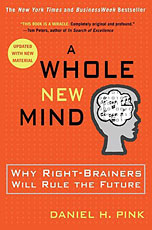Left-Brain thinking (sequential, functional, textual, and analytic) has been dominant during the Information Age; lawyers, accountants, software engineers, and others have been prized for their abilities in this approach to life. But the era of left-brain dominance is coming to an end with the ascent of the Conceptual Era where right-brain dominance holds sway. It is a form of thinking and an attitude toward life that has been underplayed for far too long; it emphasizes artistry, empathy, taking the long view, and pursuing the transcendent. These qualities have been scorned in the business world and ignored by schools. But it is now time to use both sides of the brain for the brave new world of the 21st century where workers of all stripes will need many different skills to navigate three or four separate careers.
Daniel Pink is the author of Free Agent Nation and his articles on work, business, and technology appear in many publications including The New York Times, Harvard Business Review, Slate, and Wired, where he is a contributing editor. In this updated with new material version of his bestseller, he states that individuals and organizations that want to succeed in the future are going to have to ask themselves three questions:
1. Can someone overseas do it cheaper?
2. Can a computer do it faster?
3. Is what I'm offering in demand in an age of abundance where people are looking to satisfy their aesthetic, emotional, and spiritual demands?
In the new Conceptual Era, six high-concept and high-touch attitudes, i.e. Right-Brain directed, are required. The rest of A Whole New Mind revolves around a discussion of these six senses and suggested exercises and activities we can do to spur on and stimulate them.
The first sense is Design which Pink defines as "utility enhanced by significance." He gives an example of a toaster that is used at most 15 minutes a day and sits there the rest of the time. That adds up to one percent of a toaster's time to utility and ninety-nine percent to significance. Why not make the toaster as elegant and beautiful to the senses as possible? This applies not only to home appliances but to offices, buildings, and city streets. To bone up on design the author suggests reading design magazines (a list is provided) or visiting a design museum.
The next sense is Story which Pink defines as "context enriched by emotion." The importance of story has long been accentuated in the entertainment industry but now it has become important in all types of organizations. Medical students, for example, are now being taught how to listen to the stories of their patients and respond with emotion rather than clinical detachment. Pink suggests reading short stories or visiting a storytelling festival for more practice on this sense.
Symphony is the ability to see relationships between seemingly unrelated things. It is a force field that will appeal to boundary crossers, inventors, and metaphor makers. Best of all, it signifies the importance of seeing the big picture (systems thinking, gestalt thinking, holistic thinking). Pink advises us to keep a metaphor log, do some brainstorming, or celebrate our amateurness.
The last three senses really hit home to us because they are included in our Alphabet of Spiritual Literacy: Empathy (Compassion), Play, and Meaning. Pink calls Empathy "a stunning act of imaginative derring-do, the ultimate virtual reality — climbing into another's mind to experience the world from that person's perspective." It is a key element in understanding other human beings, in health care, and in sexual politics. For exercises Pink recommends sending a heartfelt message to someone without "outsourcing your empathy" to a mass-produced card company.
In Play the author probes the value and pleasure of fun, laughter, and goofing off at home, on the job, and when you need to boost your immune system. In the exercises section, Pink suggests joining a laughter club, presents a list of video games, and dissects a joke. The final sense is Meaning where the focus is on Viktor Frankel's classic book. He urges us to take spirituality seriously and not ignore research on happiness. Pink's exercises for Meaning include expressing gratitude, taking a Sabbath, and walking a labyrinth. His closing words are "Good luck in the age of art and heart."
